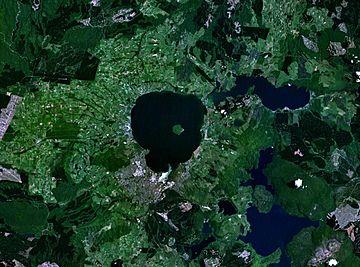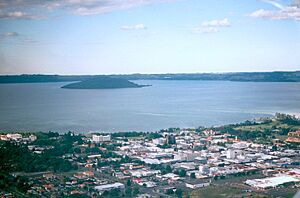Rotorua Caldera facts for kids
Quick facts for kids Rotorua |
|
|---|---|

NASA image of Lake Rotorua and caldera
|
|
| Highest point | |
| Elevation | 757 m (2,484 ft) |
| Geography | |
| Location | North Island, New Zealand |
| Geology | |
| Mountain type | Caldera |
| Volcanic arc/belt | Taupo Volcanic Zone |
| Last eruption | <25,000 years ago |
The Rotorua Caldera is a very large, bowl-shaped hole in the ground. It was formed by a volcano. This caldera is one of many big volcanoes found in the Taupo Volcanic Zone in the North Island of New Zealand.
Contents
What is the Rotorua Caldera?
A caldera is a large, hollow area that forms when a volcano's magma chamber (the underground pocket of molten rock) empties and collapses. The Rotorua Caldera is made of a type of volcanic rock called rhyolite. It is now mostly filled by Lake Rotorua.
How the Caldera Formed
The last huge eruption from this volcano happened about 240,000 years ago. It was a very powerful eruption, rated as a 7 on the Volcanic Explosivity Index. This means it was one of the biggest eruptions ever recorded.
- During this eruption, a lot of volcanic ash and rock called Mamaku ignimbrite was spread out.
- This material covered a huge area, about 4,000 square kilometers (1,500 square miles).
- After the eruption, the magma chamber under the volcano became empty.
- The ground above it then collapsed, creating the large, round depression we now call the Rotorua Caldera.
Lake Rotorua and its Islands
The caldera is about 22 kilometers (14 miles) wide. Today, this large depression is filled with water, forming Lake Rotorua.
- Mokoia Island is a small island located near the center of Lake Rotorua.
- This island is also made of rhyolite rock, just like the caldera itself.
- There are other smaller hills around the lake that are also rhyolite domes. These include Hinemoa Point, Ngongotahā, Pohaturoa, and Pukeroa.
- The most recent volcanic activity happened less than 25,000 years ago. This activity created some of these smaller lava domes.
Geothermal Activity in Rotorua
The main town in this area is also called Rotorua. It is located right inside the caldera. The town is famous for its geothermal activity. This means there are hot springs, bubbling mud pools, and geysers in the area. This activity is a sign that there is still heat from the volcano deep underground.

 | Delilah Pierce |
 | Gordon Parks |
 | Augusta Savage |
 | Charles Ethan Porter |

